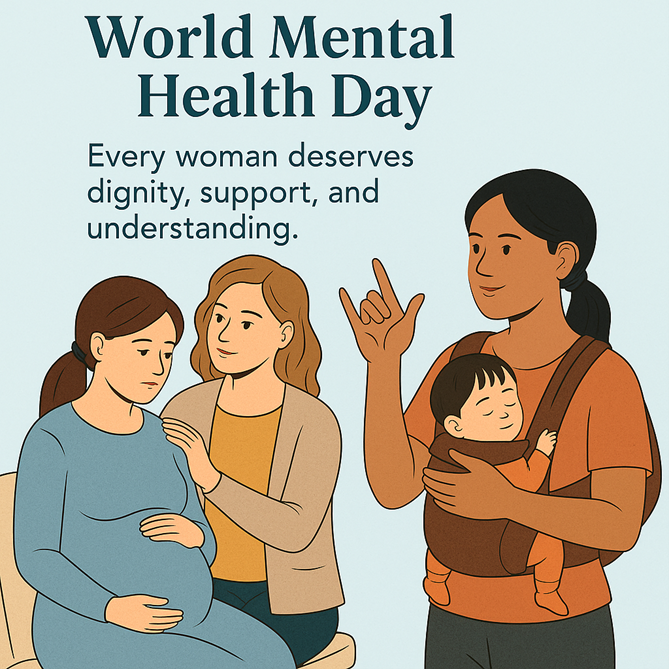World Mental Health Day 2025

10 October – World Mental Health Day 2025
“Mental Health in Humanitarian Emergencies”
Maternal mental health, disability and child development: a collective responsibility.
In certain paths of life, every word counts. Every gesture can make a difference.
Pregnancy, childbirth and postpartum are delicate moments in which mental health is an integral part of the overall health of the woman. It is a biologically and psychologically transformative phase, in which intense emotions – joy, anxiety, fear, loneliness – coexist and alternate. For many mothers with disabilities, these experiences are also shaped by the barriers they encounter. Communication obstacles, prejudice, inaccessible environments, and a lack of trained personnel can all undermine emotional well-being (WHO, 2022). . As highlighted by the World Health Organization (WHO, 2022), women with disabilities are more exposed to the risk of anxiety disorders, postpartum depression and emotional isolation. This is often caused by systems designed without including the perspective and needs of women with disabilities. When maternal health services are inaccessible, judgmental, or dismissive, they generate anxiety, isolation, and a loss of trust — all key risk factors for mental distress.
Maternal mental health is child health.
Numerous international studies show that the emotional state of the mother in the first months of the child’s life has a direct impact on his cognitive, affective and relational development (Tarasoff, 2020).
A secure attachment is built through emotional connection and the mother’s sense of confidence and safety. But when mothers are not adequately supported, when communication fails or empathy is absent, this fragile balance breaks. The result is not just emotional suffering for the mother, but a ripple effect that touches the child and the entire family system.
When care becomes exclusion
Many mothers face services that are not designed with inclusion in mind: communication tools are lacking, professionals are untrained, and environments are not adapted. Inaccessible information, dismissive attitudes, or a lack of sign language interpretation can turn even a routine examination into a distressing experience. A judgmental look or a careless remark can undermine a woman’s sense of security, trust, dignity. This stigmatization can generate a deep rift between the mother and health services, fueling mistrust, withdrawal and discontinuity in care.
As reported by the Disability Rights Education & Defense Fund (DREDF, 2023), one of the major causes of mental distress among mothers with disabilities is precisely the experience of exclusion in maternal health services. Where there is no dialogue, there can be no security. Where there is no accessibility, there can be no care.
The ASSIST project: listening, welcoming, changing.
With the ASSIST project, we are working to change this reality. We do so by training professionals and creating virtual environments in which they learn to communicate better, listening actively and understanding different forms of interactions.
The simulated scenarios we design are based on real stories: a woman with autism during a prenatal visit who is misunderstood or a deaf mother who facing barriers in communication during the postpartum period. In each story, what makes the difference is the quality of the human encounter.
A smile. A pause. A simpler explanation.
All this can be care. It can be respect. It can be mental health.
In these contexts, mental health is not an accessory to maternal care – it is its foundation. The possibility of feeling welcomed, understood, and respected can make a difference in the experience of motherhood.
Beyond emergencies: everyday barriers
The theme chosen this year by the WHO – “Mental Health in Humanitarian Emergencies” – reminds us that emergencies are not only wars or disasters. They can also be complex personal situations in which there is a lack of support, listening, empathy.
For many women, the absence of accessible, respectful, and empathetic maternal services constitutes a daily humanitarian emergency. It is a silent crisis that unfolds in clinics, waiting rooms, and delivery wards where communication fails and empathy is missing. Yet, in these moments, we can make a difference. Even a small gesture — a clearer explanation, an image, an empathic silence — can become a tool for care, mental health and inclusion (National Council on Disability, 2023).
ASSIST responds to this global challenge with concrete tools: training, prevention and emotional awareness.
It is not just a matter of guaranteeing access to facilities, but about creating environments in which every woman can feel listened to, respected, at the center of her own care journey.
References
Disability Rights Education & Defense Fund – DREDF (2023 Report). Available on https://docs.house.gov/meetings/IF/IF00/20230323/115556/HMKP-118-IF00-20230323-SD006.pdf
National Council on Disability. (2022). The role of community support in improving health outcomes for mothers with disabilities. National Council on Disability.
Tarasoff LA, Ravindran S, Malik H, Salaeva D, Brown HK. Maternal disability and risk for pregnancy, delivery, and postpartum complications: a systematic review and meta-analysis. Am J Obstet Gynecol. 2020 Jan; 222(1):27.e1-27.e32. doi: 10.1016/j.ajog.2019.07.015. Epub 2019 Jul 12. PMID: 31306650; PMCID: PMC6937395.
World Health Organization. (2022). Inclusive health care practices: Guidelines for enhancing patient understanding. World Health Organization.

